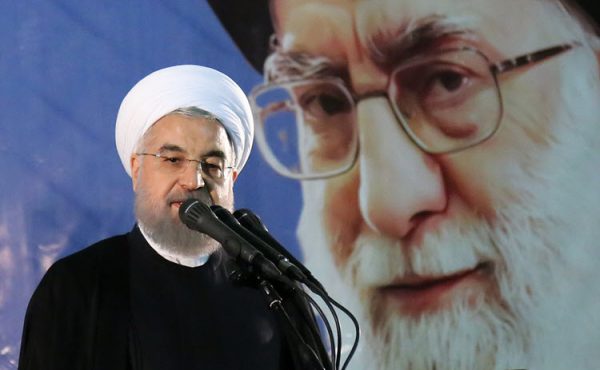
Iran said Tuesday that new US sanctions targeting its supreme leader meant a “permanent closure” of diplomacy, while the country’s president labelled the White House “mentally retarded” as tensions between Tehran and Washington escalated.
US President Donald Trump signed an executive order imposing the sanctions against Iran’s Supreme Leader Ayatollah Ali Khamenei on Monday, taking a dramatic and unprecedented step to increase pressure on Iran after Tehran’s downing of an American drone last week.
Washington said it would also impose sanctions on Iran’s Foreign Minister Zarif later this week.
“Imposing useless sanctions on Iran’s Supreme Leader (Ayatollah Ali Khamenei) and the commander of Iran’s diplomacy (Foreign Minister Mohammad Javad Zarif) is the permanent closure of the path of diplomacy,” Foreign Ministry spokesman Abbas Mousavi said in a tweet.
Iranian President Iranian President Hassan Rouhani was equally dismissive of the latest move by Washington to put Tehran under pressure.
“The White House actions mean it is mentally retarded,” he said in a speech broadcast live on state television. “Tehran’s strategic patience does not mean we have fear.”
With tensions running high between the two countries, US Treasury Secretary Steven Mnuchin said the sanctions would lock billions of dollars more in Iranian assets.
Trump told reporters the sanctions were in part a response the drone incident, but would have happened anyway. He said Khamenei was ultimately responsible for what Trump called “the hostile conduct of the regime” in the Middle East.
“Sanctions imposed through the executive order … will deny the Supreme Leader and the Supreme Leader’s office, and those closely affiliated with him and the office, access to key financial resources and support,” Trump said.
Last year, Trump withdrew the United States from a 2015 international accord to restrict Tehran’s pathway to a nuclear bomb and has since been ramping up sanctions to throttle the Iranian economy.
‘Maximum pressure’
The latest sanctions are aimed at denying Iran’s leadership access to financial resources, blocking them from using the United States financial system or having access to any assets in the United States.
“Anybody who conducts significant transactions with these sanctioned individuals may be exposed to sanctions themselves,” the White House said.
Some policy analysts say that earlier sanctions issued under Trump’s “maximum pressure” campaign are why Iran has felt compelled to adopt more aggressive tactics as its economy feels the crunch. The Trump administration wants to force Tehran to open talks on its nuclear and missile programmes and its activities in the region, saying the 2015 deal did not go far enough.
US National Security Adviser John Bolton said Tuesday that Trump had continually “held the door open to real negotiations” with Iran over its nuclear programme but that “in response, Iran’s silence has been deafening”. ‘White House is afflicted by mental retardation,’ says Iran’s president
“All that Iran needs to do is to walk through that open door,” he added while visiting Jerusalem, suggesting the US is still open to talks.
In response, Rouhani accused Washington of lying over its intentions.
“At the same time as you call for negotiations you seek to sanction the foreign minister? It’s obvious that you’re lying,” he said Tuesday.
Sanctions were also imposed on eight senior commanders of Navy, Aerospace, and Ground Forces of the Islamic Revolutionary Guards Corps (IRGC), the US Treasury Department said.
Iran said on Monday US cyber attacks on its military had failed, as Washington sought to rally support in the Middle East and Europe for a hardline stance that has brought it to the verge of conflict with its longtime foe.
Maritime Security
Washington has blamed Tehran for attacks on tankers in the Gulf in recent weeks, which Iran denies. On Monday, the United States said it was building a coalition with allies to protect Gulf shipping lanes.
A coalition of nations would provide both material and financial contributions to the program, a senior US State Department official said, without identifying the countries.
“It’s about proactive deterrence,” the official told reporters, adding that the deterrents would include cameras, binoculars and ships.
US Secretary of State Mike Pompeo is in the Middle East to discuss Iran with the leaders of Saudi Arabia and the United Arab Emirates, two Sunni Muslim allies aligned against Shi’ite Muslim Iran.
In a joint statement on Monday, the United States, Saudi Arabia, the UAE and Britain expressed concern over Middle East tensions and the dangers posed by Iranian “destabilizing activity” to peace and security in Yemen and the region.
The confrontation between Iran and the United States heated up last Thursday when Iran shot down an American drone, saying it had flown over its air space.
Washington, which said the drone was in international skies, then appeared to come close to attacking Iranian military targets, with Trump saying that he aborted a retaliatory air strike 10 minutes before it was to go ahead.
Trump said he decided the strike would have killed too many people.
Fears of War
US media have reported that Washington launched cyber attacks last week even as Trump called off his air strike. US officials have declined to comment.
Both Iran and the United States have said they do not want war and both have suggested they are willing to talk while demanding the other side move first.
Allies of the United States have been calling for steps to defuse the crisis, saying they fear a small mistake by either side could trigger war.
US allies in Europe and Asia view Trump’s decision to abandon the nuclear deal as a mistake that strengthens hardliners in Iran and weakens the pragmatic faction of President Hassan Rouhani.
France, Britain and Germany have sent an official diplomatic warning to Iran if Tehran reduces its compliance with the accord, two European diplomats said on Monday.
It was not immediately clear what consequences Iran might face for non-compliance.
(FRANCE 24 with REUTERS)

Leave a Reply
You must be logged in to post a comment.